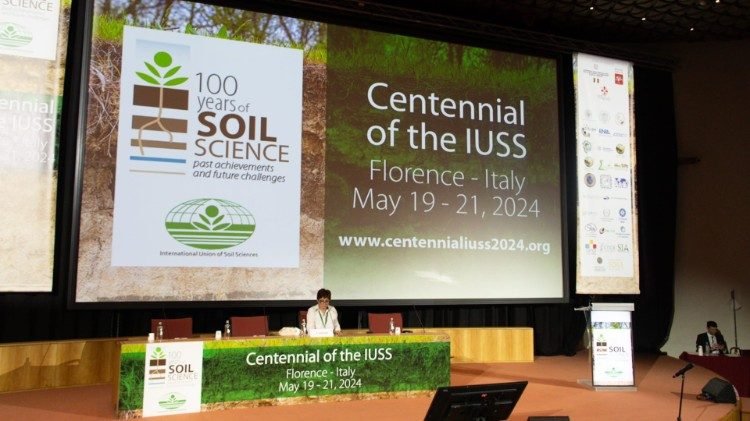Soil scientists, gathering in Florence, stress the critical role of soil in food production, climate change mitigation, and biodiversity, while highlighting the detrimental effects of altering natural vegetation and the moral implications of artificial intelligence and warfare on soil health.
By Francesca Merlo – Florence
Soil scientists are constantly exploring the origins and future care of soil, a vital component of our environment, of agriculture and of human life. Around 1,500 experts on the subject are in the Italian city of Florence to discuss advancements and future aspirations in soil science at a conference celebrating 100 years of soil science.
Alex McBratney, a soil scientist and professor of agriculture at the University of Sydney, highlighted the essential role of soil in food production, warning that altering natural vegetation for agricultural purposes can have detrimental effects.
“We can lose soil through erosion, where water or wind removes soil because we’ve got rid of all the vegetation cover,” McBratney explained in an interview with Vatican News. This process can lead to more acidic and saline soils, significantly impacting plant growth.
Salinification
McBratney elaborated on the issue of salinification, which was touched on often throughout the conference, explaining that agricultural activities reduce the amount of biomass returned to the soil, leading to a decrease in soil carbon. This loss of carbon contributes to increased CO2 levels, exacerbating global warming.
“One of the big challenges in soil science at the moment is to try to figure out how to put carbon back into the soil and mitigate climate change,” he stressed
Soil and Climate Change
Soil’s role in combating climate change is a major focus for scientists. McBratney noted that Pope Francis has made climate change one of the focal points of his pontificate, even dedicating an Apostolic Exhortation to the cause.
But in addition to climate change, Pope Francis is interested in the use, and the moral one as such, of artificial intelligence.
During his keynote address in Florence, McBratney discussed the dual nature of artificial intelligence. Explaining this further, he noted that there are the so-called “large language models,” which, although they are not always accurate, are useful, especially for foreign students who put down the main ideas. Then, “these tools can improve the quality or the gist of the language.”
“But there’s a whole other kind of artificial intelligence,” continued McBratney: machine learning. This, he explained, does not use knowledge, but only data. By accumulating data, machines try to make predictions for the future, such as how much carbon will be found in soil, and other future soil conditions. “The models themselves are hugely complex, and they’re almost beyond human understanding,” he explained.
AI and moral concerns
“Some people are concerned even more deeply about the fact that eventually, the machines, whatever they are, will be able to self-generate and probably have a level of understanding greater than we do,” he remarked.
Considering this, McBratney shared his questions about humanity’s place in a world shared with such entities. “We have no concept of what the morality of such entities might be,” he warned.
The moral concerns brought by the use of AI also brought to light another moral issue, once again close to the Holy Father’s heart: warfare.
Listen to our interview with Alex McBratney
Impact of Warfare on Soil
Warfare’s impact on soil is another critical issue. In discussing the effects that wars have on soil and agriculture worldwide, McBratney referred to his colleagues who, to this day, continue to work in Flanders, attempting to restore the soil still suffering the consequences of the First World War.
“The soil was very heavily destroyed in the First World War, and it’s taken a long time to recover.” In this case, over a century. Warfare damages soil indefinitely and studies are beginning to look at the consequences of warfare in Ukraine, where almost 10% of all the world’s precious “black soil”, rich in nutrients and microorganisms, was once a precious resource and is now a dangerous minefield.
Educating and Connecting with Soil
So, soil is everywhere, constantly changing and vital to human life and the preservation of our planet. Speaking of the importance of educating people on just how vital this otherwise somewhat nice resource is, McBratney shared a striking statistic: over half of the world’s biodiversity resides in the soil, housing millions of species of bacteria and fungi.
“Soil also holds more carbon than all vegetation and the atmosphere combined,” he said, emphasising its crucial role in addressing biodiversity and climate challenges.
“There are about seven global existential challenges,” McBratney said. “Climate change, food security, water security, energy security, human health, biodiversity, and soil security.”
“Humans have a natural connection and a natural affinity to soil,” concluded McBratney. Urbanisation has disconnected people from the land, and now over 50% live in the city, but it would be great if that connectivity could be re-established. “We have to try and build that back over time.”



